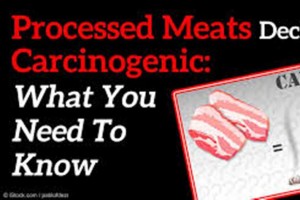Processed meat and red meat could cause cancer ?
What
is Red Meat
– It
refers to all the mammalian muscle meat. It includes beef , pork, mutton, lamb
,goat etc.
What
is processed meat
–
It is meat that is not sold fresh in the market . Instead it is transformed
through salting , fermentation , smoking , curing or other processes to improve preservation
and shelf life . It includes hot dogs, ham, bacon, sausage, and some deli meats.
It has been established that
eating processed and red meat in large quantity causes colorectal cancer.
How
processed meat causes cancer
– During cooking processed meat produces heterocyclic aromatic amines
as well as other chemicals including polycyclic aromatic hydrocarbons . These
chemicals are suspected carcinogens. When you consume it , cancer causing
compounds start residing in our body.
How
does red meat causes cancer
– In red meat problems seem to start when a chemical called haem – part
of red pigment in the blood haemoglobin is broken down in our gut to form a family
of chemicals called N nitroso compounds. These have been found to damage the
cells that line the bowel . So other
cells in the bowl lining have to replicate more in order to heal and it’s this
extra replication that can increase the chance of errors developing in the
cells DNA. This is the first step on
road to cancer .
Studies also
show that people who eat a lot of red meat are found eating fewer plant based foods. So they
benefit less from their cancer protective properties.
How
to avoid cancer
-Meat
is fine in moderation quantities , because
it’s a good source of protein, iron ,zinc etc. So its fine to include a moderate intake of
65-100 g of cooked red meat, 3-4 times a week as part of healthy balanced diet .
We should limit intake of red and
processed meats to help reduce colon cancer risk and possibly the risk of other
cancers . The occasional hot dog or hamburger is okay . But not in large
quantities .Diet should be high in vegetables , fruits and whole grains.
Avoiding tobacco , getting to and
staying at a healthy weight getting regular physical activity and limited
alcohol can also help people lower their risk of getting many types of cancers.
Is
fish and poultry are safe to eat
– Poultry products are good to eat instead of red meat and processed meat. However eating
fish may help to reduce the risk of bowel, breast and prostate cancer also.
Tips to cut down meat in your diet –
-
Fill
half your dinner plate with vegetables and do not think of meat as the main
part of the meal.
-
Use
tuna and salmon fish to make a sandwich.
-
Trim
any visible fat off the meat before you cook it.
-
Buy
lean cuts of meat .
-
For
stir fries , reduce the amount of meat and add extra vegetables.
-
Marinating
meat first prevents foods from charring as well as keeping potential cancer
causing agents down in the meat . It also
keeps the meat tender and adds flavor to
your meal.
NOTE – IARC – (International Agency for Research
on Cancer ) is the cancer agency of World Health Organisation (WHO) . Their
study group of 22 cancer experts from all over the world has classified the
consumption of red meat as probably carcinogenic to humans something that
probably causes cancer ; but they
have in a straight forward way
classified the processed meat as
carcinogen something that causes cancer.
.

